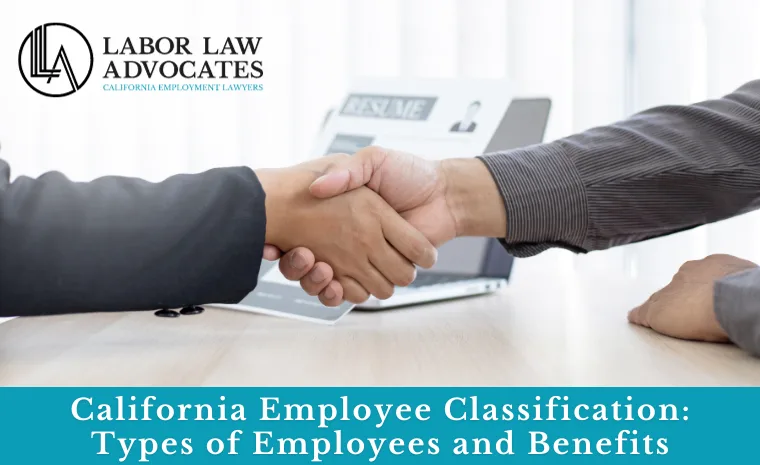California Employee Classification: Types of Employees and Benefits
In the landscape of California’s labor market, one factor stands out for both employers and employees: the classification of workers. In California, employee type classification is an important legal and regulatory consideration that determines whether a worker is considered an employee, an independent contractor, or everything in between, which has significant implications for both employers and workers, affecting various labor laws, taxes, benefits, and other aspects of the employment relationship.
California’s approach to employee classification is unique and stringent. It’s not merely about labels or semantics; it’s about the rights and protections of workers, the obligations of employers, and the overall well-being of our communities. So in today’s blog, we will explore why it matters, and what rights and obligations you have as a worker. In particular:
- How employers classify employees in California
- What is the ABC Test?
- Types of employees and benefits in California
- What to do in case of a labor dispute
How Employers Classify Employees in California
In order to accurately determine the common types of employment status in the state of California, employers should take into account a comprehensive set of factors, criteria, and periods of time, ensuring that the classification process is both thorough and compliant:
Control
This assesses how much control the employer has over the worker’s job. The more control exerted, the more likely the worker will be considered an employee. This control includes things like setting work hours, providing equipment, and supervising the work.
Financial Independence
Independent contractors typically have more financial independence. They often use their tools, equipment, and may have multiple clients, whereas employees rely on the employer for these resources.
Type of Work
If the worker’s tasks are integral to the employer’s business, they are more likely to be considered an employee. Independent contractors often perform specialized services that are not a core element of the employer’s business.
Duration of the Relationship
The length of the working relationship can also play a role. Short-term or project-based work might lean towards contractor status, while long-term, ongoing relationships are often indicative of employee status.
Mutual Agreement
The worker and the employer should have a clear, written agreement or contract specifying their relationship, and this agreement should align with the actual nature of the work performed.
Benefits and Taxes
Employees are generally eligible for benefits like health insurance, workers’ compensation, and unemployment benefits, while independent contractors are responsible for their own taxes and benefits.
Training
If the employer provides extensive training to the worker, this can suggest an employee relationship, as independent contractors are typically hired for their existing expertise.
Exclusivity
An exclusive work arrangement, where the worker can only work for one employer, tends to indicate employee status.
Understanding and correctly applying these criteria to an employee classification in California is pivotal for both employers and employees. It sets the stage for fair treatment, access to benefits, and legal protections in the workplace. Staying informed and compliant with these criteria is not just a matter of legal necessity; it’s a testament to our legislature’s commitment to the well-being and rights of the workforce.

The ABC Test
It’s important to note that California has specific laws that may make it more challenging for employers to classify workers as independent contractors. In particular, the state follows the “ABC test” as outlined in Assembly Bill 5 (AB5), which presumes workers to be employees unless the employer can demonstrate that:
- The worker is free from the employer’s control and direction in performing the work.
- The worker performs work that is outside the usual course of the employer’s business.
- The worker is customarily engaged in an independently established trade, occupation, or business.
Misclassifying workers can result in several legal consequences, including penalties, back wages, and potential lawsuits. Employers should consult with the California Division of Labor Standards Enforcement (DLSE) to ensure the proper type of employee classification, or seek the legal expertise of a labor attorney who can assess the case and determine the best course of action.
Types of Employees and Benefits in California
In California, there are various types of workers, each of whom may be entitled to social security and different company benefits or protections under state and federal law. Here are some common employee types in California and the benefits associated with them:
Regular Full-Time Employees
- Health Insurance: Many employers offer health insurance coverage to permanent employees, and the Affordable Care Act (ACA) mandates that large employers provide this benefit.
- Paid Time Off: Full-time employees typically receive paid vacation, sick leave, and holidays.
- Retirement Benefits: Under full-time employment, employers may offer retirement plans like a 401(k) with employer contributions.
- Workers’ Compensation: Full-time employees are generally covered by workers’ compensation insurance in case of workplace injuries.
Regular Part-Time Employees
Part-time employees may also be eligible for health insurance, though the availability and terms can vary by employer. They often receive prorated paid time off and may be covered by workers’ compensation.
Temporary or Seasonal Workers
Temporary or seasonal workers may receive limited benefits, if any. The availability of benefits depends on the employer’s policies.
Independent Contractors
Independent contractors are not considered traditional employees, so they typically do not receive benefits like health insurance, paid time off, or retirement plans, and are responsible for their own taxes and benefits. Freelancers and gig workers are often considered independent contractors and are not entitled to traditional employee benefits.
Unionized Employees
Employees who are part of labor unions may have negotiated benefits through collective bargaining agreements. These benefits can include higher wages, specific healthcare plans, and retirement benefits.
Government Employees
Government employees in California, such as state, local, or federal government workers, may have access to specific benefits and retirement plans provided by their respective government agencies.
Educational Employees
Teachers, professors, and other types of employees or staff in educational institutions may have access to benefits like teacher retirement systems and academic tenure.
Healthcare Workers
Employees in the healthcare industry often receive specialized benefits, including healthcare coverage, disability insurance, and continuing education opportunities.
Tech Industry Employees
Employees in the technology sector may receive unique benefits, including stock options, wellness programs, and flexible work arrangements for remote employees.
It’s essential to note that California has specific labor laws and regulations, and some local jurisdictions may have additional requirements for employee benefits depending on the types of employment. Employers are expected to comply with these laws and provide appropriate benefits based on the job role and the applicable legal requirements.
Employee benefits and their eligibility can vary significantly depending on the employer, industry, and agreements. Therefore, it’s important for employees to review their employment contracts and discuss benefits with their HR department to understand what is offered to them.
What To Do in Case of a Labor Dispute
In California, if you find yourself in a legal labor dispute, it’s crucial to understand your rights and the steps you can take to resolve the issue. Labor disputes can cover a wide range of employment-related problems, including wage disputes, wrongful termination, discrimination, harassment, or workplace safety concerns. Here’s a general guide on what to do in case of a legal labor dispute in California:
Document the Issue
Start by documenting the details of the dispute. This includes collecting evidence such as emails, pay stubs, witness statements, and any other relevant documents. A strong factual foundation is essential if the matter escalates.
Contact Your Employer
In many cases, it’s advisable to attempt an informal resolution first. Speak to your employer or HR department about the problem and try to reach a mutual agreement. Make sure to keep a record of these discussions.
Consult an Attorney
If the dispute remains unresolved or if it involves complex legal issues, consult an attorney who specializes in labor and employment law. An attorney can provide guidance on your rights and potential courses of action.
File a Complaint
Depending on the nature of the dispute, you may need to file a complaint with a relevant government agency. Some common agencies in California include:
- Department of Fair Employment and Housing (DFEH): Handles discrimination and harassment claims.
- Division of Labor Standards Enforcement (DLSE): Addresses wage and hour disputes, such as unpaid wages, overtime, and meal and rest break violations.
- Occupational Safety and Health Administration (Cal/OSHA): Deals with workplace safety and health concerns.
- Employment Development Department (EDD): Manages unemployment and disability claims.
Mediation and Arbitration
In some cases, you may be required to participate in mediation or arbitration, which can be a less formal and more cost-effective way to resolve disputes compared to going to court.
File a Lawsuit
If all else fails, you may need to file a lawsuit. Consult your attorney to determine the appropriate course of action. California has various state and federal regulations that your attorney can navigate to ensure a proper resolution.
Retaliation Concerns
Be aware that California law prohibits employers from retaliating against employees who assert their rights or file complaints. If you experience retaliation, document it and consider taking legal action.
Stay Informed
Keep yourself informed about your rights and the specific laws that apply to your situation. Labor and employment laws can change, and it’s essential to be aware of your legal protections.
Remember that labor disputes can be complex and time-consuming. It’s crucial to be patient and persistent, seeking appropriate legal advice and guidance throughout the process. Always consult a skilled attorney to ensure that you fully understand your rights and the best course of action for your specific situation.
Labor Law Advocates Fights for Your Rights
As a resident of California, it is essential to be aware of your rights and protections as a worker. By understanding your employee type, the available legal resources, and how to rectify any misclassification, we can collectively work towards a more just and equitable society. Every worker deserves their rightful benefits, so they can support themselves, and their families and contribute to the prosperity of our great state.
If you experienced any form of employee misclassification, Labor Law Advocates has a team of award-winning attorneys who specialize in employment rights and labor laws. We can help you file a claim and recover what you rightfully deserve.
Consult with the most qualified employment attorney in California for legal advice today. Speak with one of the experts at Labor Law Advocates for a free consultation. We are available 24/7. Call us anytime at (424)-688-3632.




